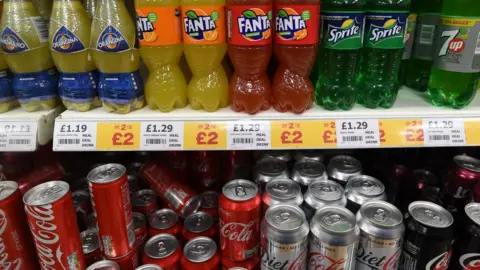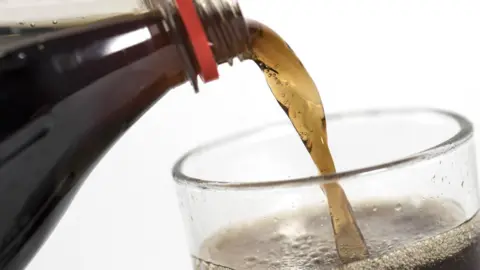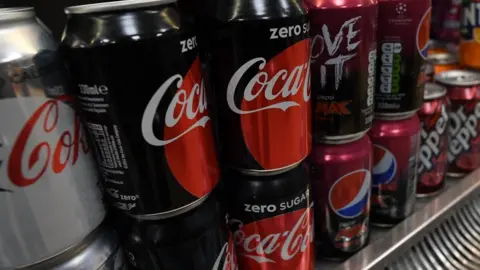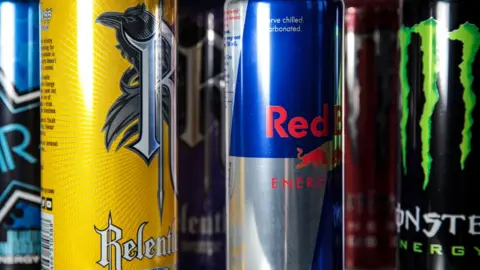Fizzy and diet drinks: What we know and what we don't
 Getty Images
Getty ImagesOnce again today, a health story about fizzy drinks is being widely shared online.
Some of the newspapers went big with the study too - which claimed two diet drinks a day could be linked to people dying young.
Similar warnings get splashed all over newspapers and websites regularly, about diet drinks and about regular fizzy drinks - the ones we love to call "full-fat".
But how worried should you actually be?
Radio 1 Newsbeat's been chatting to Dr Frankie Phillips from the British Dietetic Association.
So how bad for you are fizzy drinks?
Let's be clear straight away. Diet or not, they're not great for you, and your teeth really don't like them.
"The problem with fizzy and diet drinks is they're very acidic," Dr Frankie tells Newsbeat.
"They can cause erosions to the dental enamel, potentially dissolving the enamel on our teeth".
Those full-fat ones especially bring with them a number of health problems, most relating to their high sugar content.
"With sugary fizzy drinks, they're going to be providing extra calories.
"But unlike other foods which provide calories and also a range of vitamins, minerals, proteins and fibre, we don't get anything extra from just sugar sweetened fizzy drinks apart from the sugar energy."
"There has been a link between fizzy drinks and increased risk of type two diabetes. This is something that we're really concerned about."
Will fizzy drinks really make you die younger?
 Getty Images
Getty ImagesOn their own, probably not, according to Dr Frankie.
"It's true that those people who have lots of fizzy drinks seem to be at increased risk of disease and this might mean that they are at risk of dying younger," Frankie says. But there's a big but coming.
"But, (told you) we need to be very careful about studies like this. It's just an association, a link that's been made and it doesn't mean it's the cause and effect."
Often people who have lots of fizzy drinks tend to have a poorer diet overall. So things like more fatty foods and less exercise.
"We need to unpick what's actually happening across the diet. We need to look at what their salt intake is like, what their fibre levels are like, their sugar intake, calories, fats. Fizzy drinks might be a marker of a poor diet but it doesn't mean fizzy drinks make you die young."
Diet / Zero drinks, or full fat?
 Getty Images
Getty ImagesWell they're both bad for your teeth, we covered that earlier. And sugar is definitely fattening, but what about the artificial sweeteners used in diet and zero versions?
"It's not really an either or, it's not a choice between the sugary fizzy drink and the diet fizzy drink," Frankie warns.
"With artificial sweeteners, there's still debate on the use of them and whether they're healthy.
"Will they help you keep a healthy weight? The jury is still out on that. If you're going to have a fizzy drink, if you're concerned about your calorie and sugar intake then go for a diet one more often.
"But my advice would be to just have a fizzy drink at mealtimes or with a meal rather than in-between, that's the most damage to your teeth."
But the one to watch out for is...
Some of the energy drinks. Frankie says they're not suitable for children.
The huge amounts of caffeine and sugar is not only bad for your teeth and weight, but can also cause sleeplessness and agitation.
 Getty Images
Getty ImagesHaving one occasionally isn't too bad. Having two or three a day really is.
If you're looking for fizzy drink alternatives, milk has more protein, unsweetened tea has less sugar and fruit juice has more natural sugar.
Cutting down on fizzy drinks will really help your body, which is not surprising.
Neither is what health experts say is the best drink for you.
Nothing beats water to properly hydrate your body. It won't make you put on weight and it won't damage your teeth. And there isn't a diet version to confuse you.

